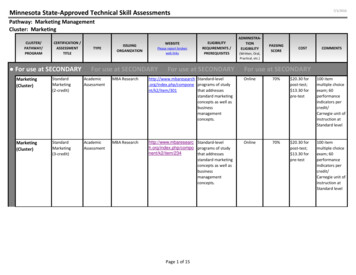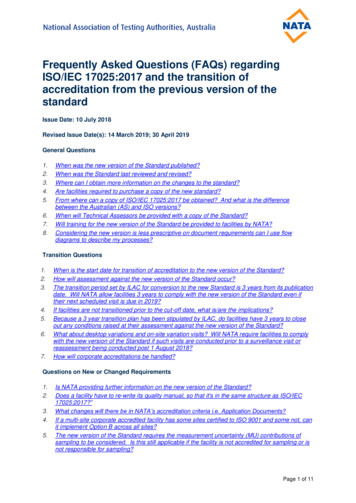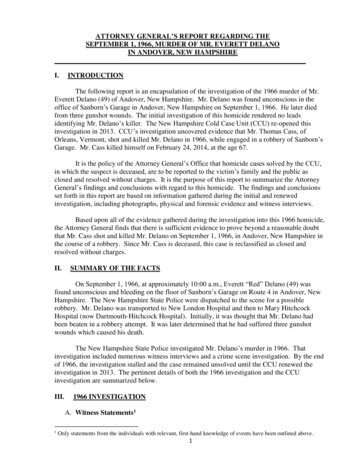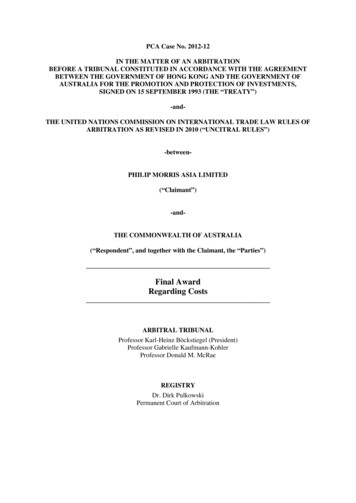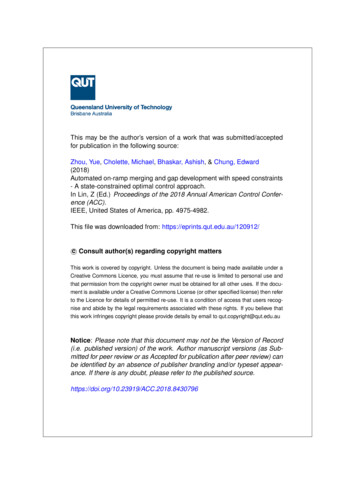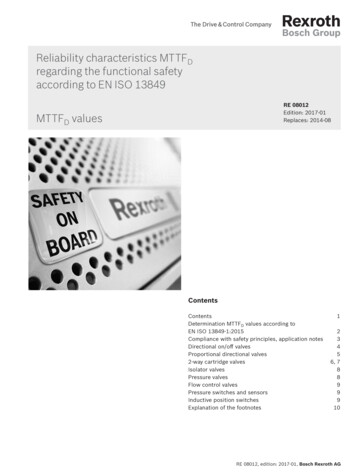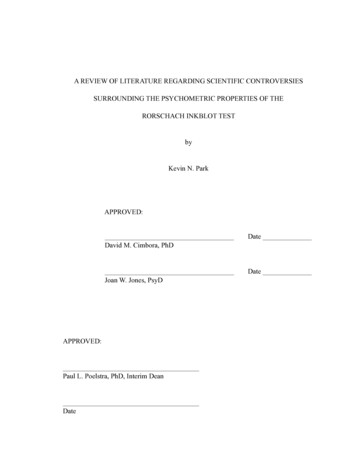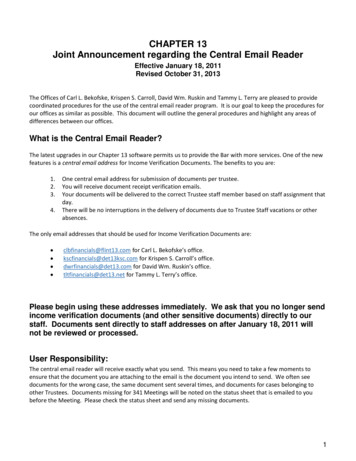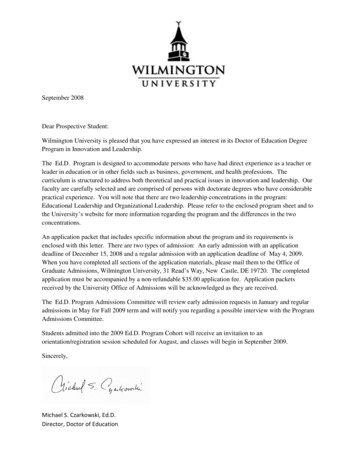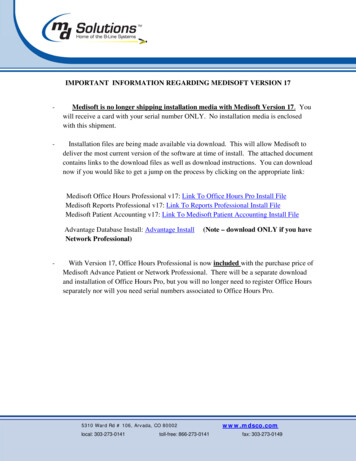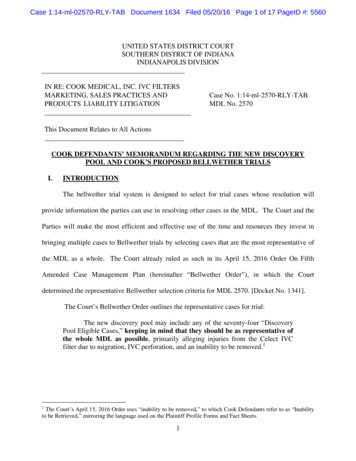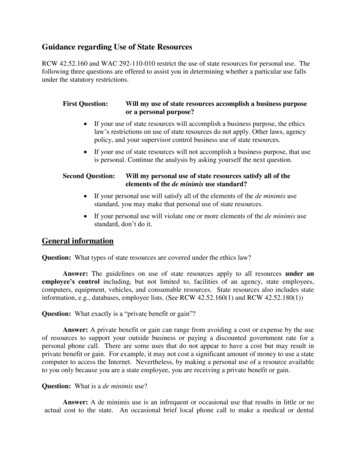
Transcription
Guidance regarding Use of State ResourcesRCW 42.52.160 and WAC 292-110-010 restrict the use of state resources for personal use. Thefollowing three questions are offered to assist you in determining whether a particular use fallsunder the statutory restrictions.First Question:Will my use of state resources accomplish a business purposeor a personal purpose? If your use of state resources will accomplish a business purpose, the ethicslaw’s restrictions on use of state resources do not apply. Other laws, agencypolicy, and your supervisor control business use of state resources. If your use of state resources will not accomplish a business purpose, that useis personal. Continue the analysis by asking yourself the next question.Second Question:Will my personal use of state resources satisfy all of theelements of the de minimis use standard? If your personal use will satisfy all of the elements of the de minimis usestandard, you may make that personal use of state resources. If your personal use will violate one or more elements of the de minimis usestandard, don’t do it.General informationQuestion: What types of state resources are covered under the ethics law?Answer: The guidelines on use of state resources apply to all resources under anemployee’s control including, but not limited to, facilities of an agency, state employees,computers, equipment, vehicles, and consumable resources. State resources also includes stateinformation, e.g., databases, employee lists. (See RCW 42.52.160(1) and RCW 42.52.180(1))Question: What exactly is a “private benefit or gain”?Answer: A private benefit or gain can range from avoiding a cost or expense by the useof resources to support your outside business or paying a discounted government rate for apersonal phone call. There are some uses that do not appear to have a cost but may result inprivate benefit or gain. For example, it may not cost a significant amount of money to use a statecomputer to access the Internet. Nevertheless, by making a personal use of a resource availableto you only because you are a state employee, you are receiving a private benefit or gain.Question: What is a de minimis use?Answer: A de minimis use is an infrequent or occasional use that results in little or noactual cost to the state. An occasional brief local phone call to make a medical or dental
appointment is an allowable de minimis use of state resources. The cost of a brief phone call isnegligible and is not likely to interfere with your job. The following examples address “deminimis” use: (See WAC 292-100-010(3)(a))Example A: An employee makes a telephone call or sends an e-mail message tohis/her children to make sure that they have arrived home safely from school.This is not an ethical violation as long as the call or e-mail is brief in duration,there is little or no cost to the state, i.e., your SCAN code is not used, and sendinga brief message does not interfere with the performance of official duties.Example B: An employee uses his/her agency computer to send electronic mailto another employee wishing them a happy birthday. This is not an ethicalviolation. The personal message is brief and does not interfere with theperformance of official duties.Example C: Every spring a group of employees meets during lunch to organizean agency softball team. The meeting is held in a conference room that is notneeded for agency business during the lunch hour. This is not an ethical violation.There is little or no cost to the state, the meeting does not interfere with theperformance of official duties, and off site recreational activities such as softballteams can improve organizational effectiveness.Question: What does “promoting organizational effectiveness” really mean?Answer: State agencies may allow employees to participate in activities that are notofficial state duties but promote organizational effectiveness by supporting a collegial workenvironment. Often these activities involve an accumulated use of state time or resources that ismore than de minimis. So long as the employees who participate in the activity limit their use ofstate resources, then these activities would not undermine public confidence in state government.(See WAC 292-100-010(2(b)(iii))Example: An agency determines that an agency wide retirement lunch willenhance organizational effectiveness. The retirement lunch will last a half hourlonger than the normal one hour lunch break, which totals 15 hours of paid timefor the agency. An employee uses his or her office computer to compose a flyerabout the lunch, send a few reminder e-mails, and collect for a retirement present.This is not an ethical violation. While the accumulated time use may not meet thelimited de minimis use standard, the use supports organizational effectiveness andwas approved by the agency. Since most of the activity takes place outside ofnormal working hours, it will not interfere with the performance of eachemployee's official duties. In addition, the employee’s use of the office computerand printer will result in little or no cost to the state.Question: Can state time be used for baby showers and promotion parties for employees (toincrease moral and show support), and if so, how much?
Answer: See previous answer for details regarding ethical violations. Consult youragency’s policies for agency-specific restrictions.Question: Can I use my state telephone (land line) or email to make appointments or take careof other personal matters?Answer: Generally, yes. Although state telephones and computers are providedprimarily for state business, they may be used for a small amount of personal communication tomeet the demands of daily living. Employee use must be limited and occasional and must notcost the state money or interfere with work. For example, an employee may use a statetelephone or computer to make a doctor's appointment or a lunch date, check in with familymembers, or arrange for transportation. Note, however, that individual supervisors anddepartments may have more strict policies on telephone and email use for reasons related tospecific work situations.Question: Can I use the copier at work to make one copy of my birth certificate or some otheritem?Answer: Yes, This would fall under the de minimis use standard.Outside activitiesQuestion: Can I leave menus for local restaurants in the break room?Answer: Yes. If an agency merely has menus available for state employees or officersto use when ordering lunch it would is not be considered a violation.Question: May an individual state officer or employee use state facilities, including state paidtime, to participate in the creation or review of articles and other advertising materials that willbe used to promote private commercial products and services?Answer: No – The Ethics Act contains a strong presumption against an individual stateofficer or employee using his or her official position and public resources to promote privatecommercial products. When state officers or employees are seen to favor one product overanother, it significantly undermines vendor confidence in the agency’s or the state’s contractorselection process. While a state officer and employee should avoid participating in thepreparation of private promotional materials, they may respond to reference inquires and mayreview vendor statements about the business relationship to ensure that they meet agencypolicies and contracting rules.Question: May a state officer or employee, acting within the course of official duties and underthe authority of his or her agency, use state facilities, including state paid time, to promoteprivate commercial products and services?Answer: Yes under certain conditions – State officers and employees may use stateresources for work that is reasonably related to the conduct of official duties. Where state
agencies with appropriate authority have entered into contracts and other commercialrelationships that provide for agency endorsement or promotion of a private product, such a useof state resources would not violate the Ethics in Public Service Act.Question: If I use a state resource, can't I just reimburse my agency for the use?Answer: No. Reimbursing for a personal use may result in a personal benefit and mayimpose significant administrative burdens on the state. For example, the price of a SCAN call isless than you would pay using your local telephone company. Reimbursing also creates themisperception that personal use is ok as long as we pay for it. Personal use should be theexception not the rule. (See WAC 292-100-010(5))Question: The Red Cross holds a safety fair in our building and as part of their display sells firstaid kits. Does this violate the Ethics Law?Answer: No. The Department of Labor and Industries requires state agencies toestablish a safety committee. See WAC 296-800-13020. These committees prepare and monitorsafety and security plans for their agencies as part of their disaster preparedness program. Manyof these plans require employees to provide emergency supplies for themselves in case of anatural disaster or major incident to augment the agency-provided supplies. To assist employeesin gathering the supplies they need, agencies have allowed the American Red Cross to sell firstaid kits, emergency items and other materials to state employees during safety fairs and otheragency-sponsored gatherings.E-mail and Internet UseQuestion: Can I send a personal e-mail message without violating the ethics law?Answer: Yes. The general ethics standard is that any use of a state resource other thanfor official state business purposes needs to brief in duration and frequency to ensure there islittle or no cost to the state and the use does not interfere with the performance of official duties.Extensive personal use of state provided e-mail is not permitted. (See WAC 292-100-010(3)(a))Question: Are my e-mail or voice messages private?Answer: No, if you use state equipment do not expect a right to privacy for any of youre-mail or voicemail communications. E-mail and voicemail communications may be consideredpublic records and could be subject to disclosure. Aside from disclosure, employees shouldconsider that e-mail communications are subject to alteration and may be forwarded tounintended recipients. Avoid these potential problems by treating e-mail communications asanother form of business correspondence. (See WAC 292-100-010(4))Question: What are the guidelines on Internet use?Answer: Any personal use of state provided Internet access must be both brief andinfrequent. Extensive personal use of state provided Internet access is not permitted. In
addition, your agency may have more stringent policies regarding personal use of the Internet, soplease review them before using the Internet. The following examples address uses of theInternet:Example A: Several times a month an employee quickly uses the Internet to checkhis or her children’s school website to confirm if the school will end early that day.The transaction takes about five minutes. This is not an ethical violation. The use isbrief and infrequent, there is little or no cost to the state, and the use does not interferewith the performance of official duties.Example B: An employee uses the Internet to manage her personal investmentportfolio and communicate information to her broker. This is an ethical violation.Using state resources to monitor private stock investments or make stock trades, areprivate activities that can result in a private financial benefit or gain. Allowing evenan occasional or limited use of state facilities to facilitate a private financial gainundermines public confidence in state government.Example C: An employee spends thirty to forty minutes looking at various web sitesrelated to a personal interest. This is an ethical violation. The use is not brief and caninterfere with the performance of state duties.Example D: An employee visits several humor and joke sites. While at a site, he/shedownloads a joke file and e-mails it to several co-workers. This is an ethicalviolation. By e-mailing a file to co-workers the employee disrupts other stateemployees and obligates them to make a personal use of state resources. In addition,downloading files and distributing them to co-workers can introduce a computervirus, which can compromise state databases.Question: Can a state employee or state officer access their Linked In, Facebook or Twitteraccounts or pages from their state computer if the access is for the purpose of promoting theirstate agency or state web site and directly linked to their job?Answer: If the use was for part of the employee’s or officer’s official duties, there is noethical issue. If it was not for an official duty, it would fall under the de minimis use rule.Question: What do I do if I access the wrong Internet site?Answer: Don't panic! The best thing to do is to back out of the site and remember whatit was that got you there and don't go back. Everyone makes this kind of mistake. It is alsoadvisable to contact your supervisor or information systems staff to notify them of your mistake.Question: May a state agency maintain a direct internet link to private non-governmental web sites?Answer: Yes - So long as the private organization does not post messages or advertisementson its web site or home page that advocate for, or against, a ballot initiative or political candidate.Providing a direct link to a web page or linked document that includes materials that advocatepolitical positions, however, would violate RCW 42.52.180.
Question: May a state agency establish an internet link to a private web page which does notcontain materials that advocate for, or against, a ballot initiative or political candidate even thoughthe private web sites homepage may contain material that advocates for, or against, a ballot initiativeor political candidate?Answer: Yes - So long as any materials or advertising that advocates for, or against, a ballotinitiative or political candidate was located on another web page or linked document within theorganization’s web site. State agencies that provide links to private web sites should initially verifythat the linked web page does not contain political advocacy and establish a reporting mechanism oragreement that will allow the agency to suspend the link if the contents are changed.Use of State or Resources to Support CharitiesQuestion: Can I use state resources to support charities?Answer: The limited use of state resources to support charities may be allowed if anagency head or his/her designee, approves the activity as one that promotes organizationaleffectiveness. Approval may be in the form of a specific policy that establishes guidelines forlimited use of state resources. (See WAC 292-100-010(2)(b))Examples of limited use: Sending an e-mail to notify employees of a blood drive.A bake sale to support an Adopt-A-Family Program. Here, the baking would beperformed at home and after working hours. The baked goods are then displayed forpurchase during break times and the lunch hour. When gifts are purchased for the family,the purchases are made after working hours.Question: Is there anything employees shouldn't do while conducting charity work on statetime?Answer: Any use of state resources that results in an expenditure of funds should beavoided. Consider this scenario: a group of employees spend 6 working hours of staff time aweek for over a four-week period to plan a charitable fund-raiser, and use the computer, fax, andcopier to produce fund-raising materials. This is an expenditure of state funds that would not beconsidered a de minimis or limited use of state resources.Example: An employee is active in a local PTA organization that holds fund-raisingevents to send children to the nation’s capital. Although a parental payment ofexpenses for the trip is expected, the more raised through individual contributions, theless the parent must pay. The employee uses agency e-mail to solicit contributions tothe fund-raiser from a broad distribution list of co-workers. The e-mail asks eachrecipient to pass along the e-mail to other state employees. This is an ethicalviolation. The employee is using state resources to promote an outside organizationand a private interest. By sending the e-mail to other state employees and asking stateemployees to pass the solicitation along, the employee is asking other state employees
to improperly use state resources in a manner that interferes with the performance ofofficial duties.Question: May state officers or employees use state resources to coordinate state-wide volunteerconstruction projects?Answer: No. It is likely that coordinating state-wide volunteer construction projects would usestate resources beyond those permitted by WAC 292-110-010 and has potential to interfere with theperformance of official duties. Therefore, this project would violate WAC 292-110-010.Question: May state officers or employees use state resources to coordinate an occasional fundraising activity for charity?Answer: Yes. An occasional charitable fund-raising event, such as a holiday bake sale,would likely not be a violation of WAC 292-110-010 because it involves de minimis use of stateresources, would not interfere with official duties.Question: Can I sell items from my kid’s charitable organization such as Girl Scout cookiesand/or school fundraisers that sell candy or magazines in the workplace?Answer: You may be able to, if it falls within “organizational effectiveness.” Thatmeans that the agency head has approved the activity and acknowledges that it relates to anagency’s mission and encompasses activities that enhance or augment the agency’s ability toperform its mission.Question: What about the Combined Fund Drive?Answer: The Combined Fund Drive is somewhat different than other independentcharitable organizations because it has been established by the stat legislature. Therefore, it ispart of the official duties of those employees who are assigned by the agency to conduct theDrive. Fund Drive coordinators should confine the time and effort spent conducting the drive toagency guidelines. (See WAC 292-110-010(3)(b) and EEB Advisory Opinion 00-09)Question: What about the employees who are not officially assigned to conduct the CombinedFund Drive?Answer: As noted above with charitable groups, the use of state resources to support theCombined Fund Drive charities should be reasonable, involve little or no cost to the agency, andshould not disrupt the conduct of official business in state offices. (See WAC 292-110-010(3)(b))and EEB Advisory Opinion 96-11)Question: Can an agency participate in a commercial activity that benefits the Combined FundDrive?Answer: State agencies should avoid direct involvement in commercial activity even ifthe proceeds may benefit the Combined Fund Drive. Examples of improper direct involvement
include distributing commercial product sales brochures and order forms to agency employees,collecting product order forms in the workplace or on state paid time, and distributing productsin the workplace or on state paid time.Question: Can agency employees solicit donations for charitable events from outsidebusinesses?Answer: The state's ethics law contains a very strong presumption against solicitation byany state officer or state employee for any purpose, including charitable events. Solicitation bystate employees can create the appearance that a donation might result in favorable treatmentfrom the state, whereas a failure to donate might result in unfavorable treatment. A state officeror state employee whose official duties include regulation or the contracting for goods andservices needs to be especially careful about solicitation. State officers and employees may notuse their official state positions to solicit goods and services from private organizations andbusinesses. The following examples address solicitation on behalf of charitable organizations.(See RCW 42.52.070, RCW 42.52.140 and RCW 42.52.150(4))Example A: The head of a state agency purchasing office sends a letter requestinggifts or donations for use at a CFD kick off luncheon to several vendors who providegoods and services to the agency. This is an ethical violation. While the purchasingsupervisor will not personally benefit from the gifts, the CFD charities and the giftrecipients would benefit from them. In addition, it would be reasonably expected thatvendors who respond favorably to the solicitation did so with the intent to influence thevote, action, or judgment of the purchasing supervisor. (See RCW 42.52.070 and RCW42.52.140)Example B: The head of a state agency sends a letter to local businesses, includingseveral vendors who provide goods and services to the agency, requesting gifts ordonations for a use that will benefit agency employees and a private charity. This isan ethical violation. While the agency head will not personally benefit from the gifts,the private charity would benefit from them. In addition, it would be reasonablyexpected that vendors who respond favorably to the solicitation did so with the intent toinfluence the vote, action, or judgment of the agency head. This expectation in thevendors would be true even if the agency head did not routinely participate in suchdecisions. (See RCW 42.52.070 and RCW 42.52.140)Example C: On their lunch break a group of agency employees who work for anagency that regulates or administers benefits for private business, but who are notpersonally involved in regulating or administering benefits for their agency, solicitholiday gifts on behalf of a family sponsored by Adopt-a-Family. When soliciting thegifts they voluntarily inform the businesses that they are employed by their stateagency but are soliciting on behalf of the sponsored family or Adopt-a-Family. Thisis an ethical violation. By stating that they are employed by an agency that regulatesor administers benefits for the private businesses they are using their state positions toinfluence the private businesses and support the private charity. (See RCW 42.52.070)
Example D: On their lunch break or after work a group of agency employees who areinvolved in regulating or contracting on behalf of their agency solicit holiday gifts onbehalf of a family sponsored by Adopt-a-Family. They do not solicit from agencyvendors or other individuals with whom they conduct state business. When solicitingthe gifts they tell the businesses that they are soliciting on behalf of the sponsoredfamily or Adopt-a-Family. This is not an ethical violation. By soliciting on behalf ofthe private charity and not a state agency they are not using their state positions toinfluence the private businesses. In addition, the employees are not using state paidtime or resources for the solicitation.Example E: After work or on the weekend a group of state employees solicit holidaygifts on behalf of a family sponsored by Adopt-a-Family or their local private school.They solicit door to door in their neighborhood and do not solicit from agencyvendors or other individuals with whom they conduct state business. When solicitingthe gifts they indicate that they are soliciting on behalf of the private school, thesponsored family, or Adopt-a-Family. This is not an ethical violation. Theemployees are not using their state positions to influence the private businesses andare not using state resources to support the private charities.Question: What other considerations should you take into account when conducting charitablesolicitations?Answer: Avoid direct personal solicitations of your co-workers and colleagues and optfor voluntary participation. Managers and supervisors should always avoid direct personalsolicitations of employees who work under their supervision.Question: If you can’t solicit, then what can you do?Answer: A state employee may purchase a gift certificate or other item for its fairmarket value and donate the item to an agency-sponsored charitable event.TelecommutingQuestion: Can I have our IT department work on my personal computer to fix a problem thatoccurs while I am working from home on my own personal computer to access our agency’snetwork?Answer: It would depend upon the type of problem that is occurring. If your computermalfunctions while you are conducting official business on your personal computer, youragency’s IT department would be able to assist you in troubleshooting the problem. If theproblem is with any agency-provided software or hardware, they would be able to replace orrepair that portion, but if the problem is strictly with your own computer, you would have torepair that at your own expense.Question: Can I bring my personal laptop it into work and have our IT department work on it ifI use it for agency work and I experience a virus or other problem?
Answer: No, you would need to repair your personal laptop on your own regardless ofhow much you used it for agency work.Question: If an agency substitutes a state officer's or employee's personal computer equipmentwith state equipment so that the officer or employee can work at home, may the officer or employeemake the same private use of the replacement state equipment that he or she could make of his orher personal equipment?Answer: Yes. RCW 42.52.160 and WAC 292-110-010 limit the private use of statecomputer equipment. However, if an agency, for a legitimate agency purpose, substitutes stateequipment for an officer's or employee's personal equipment, the officer or employee may use thestate equipment on the same basis that he or she could use his or her personal equipment.Question: Can I use my own iPhone/cell phone for both personal and work related purposes?Answer: Yes, you may use your personal iPhone/cell phone for state business, but youcannot use a state iPhone /cell phone for anything other than use that would qualify under the deminimis use standard. There may be adverse tax implications for using a state iPhone/cell phonefor personal use. Also refer to your agency’s policy regarding personal use.Job huntingQuestion: Can employees use state resources (time and computer) to fill out state applications,prepare resumes for state employment, and then apply for state jobs?Answer: Yes, within the de minimis use standard. Under WAC 357-31-325, asupervisor must allow a state employee to take paid leave to take state exams and participate instate interviews, but can, depending on agency policies, allow the state employee the ability tocomplete these tasks without taking leave. However, an agency does not have to grant paid leaveif the time requested by the state employee becomes excessive.Question: Can employees use state resources (time and computer) to apply for, prepare resumesand other correspondence for jobs outside of the state system?Answer: No, state employees and officers must use their own personal resources andtime when seeking employment outside of the state system.MiscellaneousQuestion: Can I take home an empty box, such as the kind copier paper come in, for personaluse?Answer: Yes, if the box merely housed the item that the agency actually needed to use.If the box was purchased by the agency to archive records or for other storage, then the box isconsidered a state resources and you would not be able to take them home for personal use.
Question: Can state employees take home recycled paper that is going to be hauled away by afor fee vendor?Answer: It would depend on the information contained on the paper being recycled. Ifthe information on the paper was confidential, then state employees/officers would not be able totake the paper home – it would have to be hauled away by the vendor where it is shredded. If therecycled paper contained no confidential information, it would at the agency’s discretion as towhether it would allow agency employees to take the paper home.WellnessQuestion: Is the de minimis use of staff time and resources to support recreational activities as partof an agency wellness program a violation?Answer: No. WAC 292-110-010 provides for de minimis use of state resources; the deminimis usage includes copier supplies, limited e-mail communication time, and the use ofdepartmental conference rooms during non-scheduled work hours for the activity planning process.Question: Can state time be used for exercising as part of an agency wellness effort?Answer: It depends on the program. If the agency is having everyone participate in anexercise at the same time, i.e., an afternoon walk for a wellness initiative, then the exercisewould be an activity for organizational effectiveness and use of state time would be permitted.If each agency employee just wanted to exercise individually to get or stay in shape, they wouldhave to accomplish that their own time.Union activitiesQuestion: Can I use state facilities (email, phone, state time) to assist my union?Answer: Although unions are private entities, the official purpose of collectivebargaining laws is to enhance the relationship between public employers and their employees.Therefore, an agency may agree to allow individual employees to make certain limited use ofstate resources and state paid time for the purposes of the negotiation and administration ofcollective bargaining agreements.Question: May a state employee use state vehicles or other state resources to attend meetings orconduct union business related to contract negotiation and administration?Answer: The Board and state labor laws recognize a unique relationship between aunion as the exclusive representative of state employees and state agencies. Therefore, anagreement between an exclusive representative and a state agency for the use of state paid timeand resources for the exclusive purposes of contract negotiation and administration would notviolate the Ethics in Public Service Act.
Question: Does the Ethics in Public Service Act prohibit certain uses of State facilities by aunion?An
First Question: Will my use of state resources accomplish a business purpose or a personal purpose? If your use of state resources will accomplish a business purpose, the ethics law’s restrictions on use of state resources do not apply. Other laws, agency policy, and your supervisor
